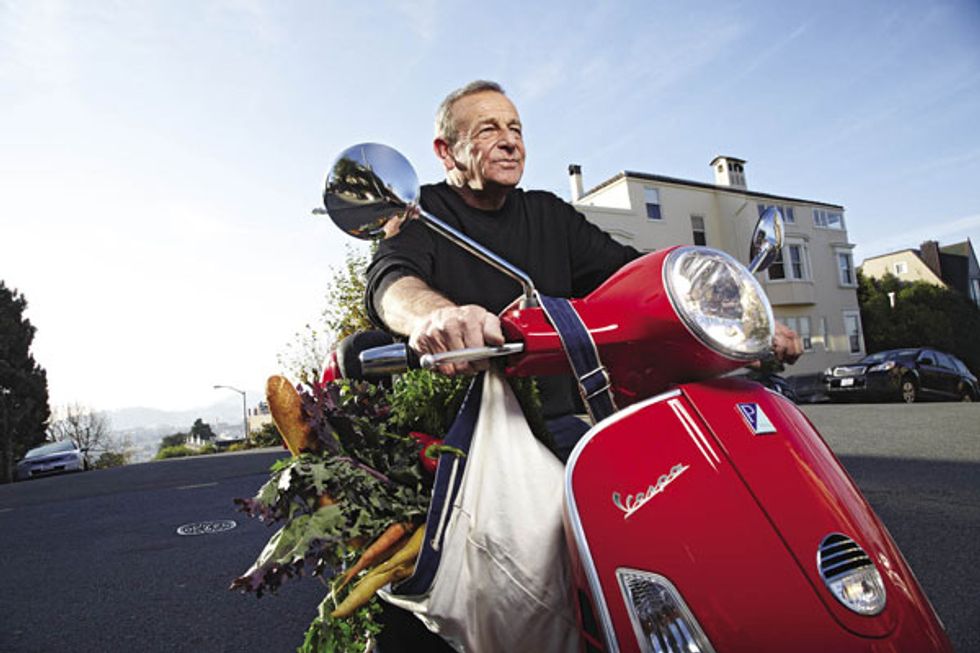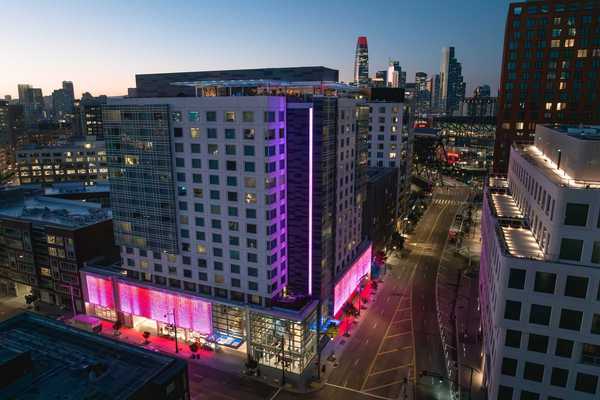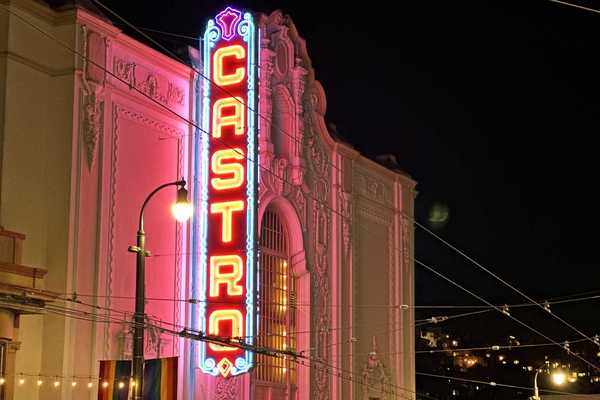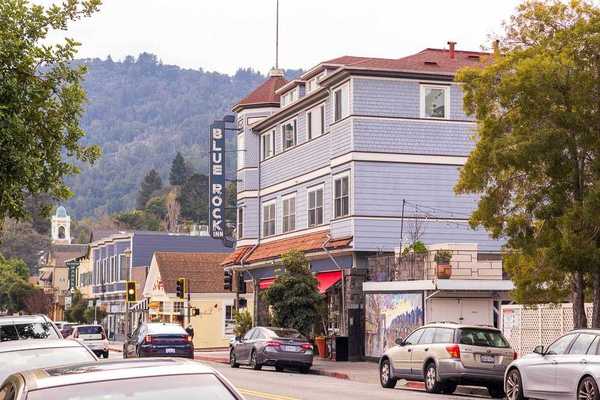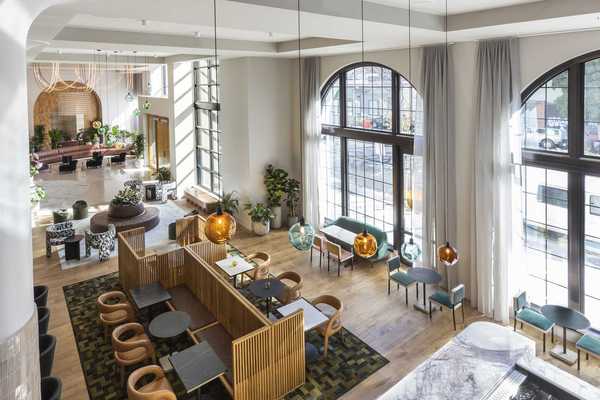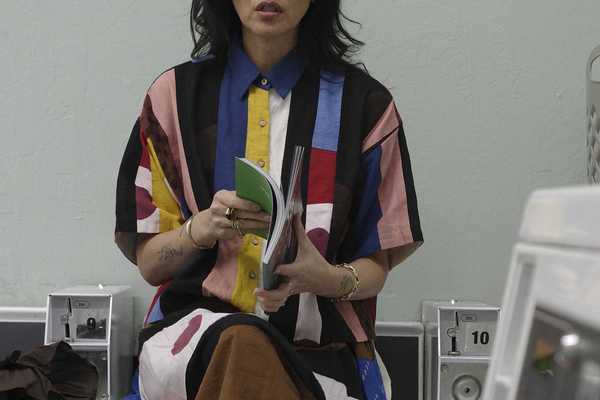The entire time we’re touring the University of San Francisco kitchen, which produces 4,000 meals a day for students and faculty, Fedele Bauccio holds my hand. It’s unconscious, but as he gets more excited—pointing out boxes of locally grown vegetables in the walk-in refrigerators and stopping at one of the food stations to taste the chile verde—his grip tightens.
The 69-year-old CEO of food service company Bon Appétit Management moves so quickly that hand-holding is necessary to keep up. His company operates cafeterias that bring the local-sustainable movement to more than 400 venues nationwide—from private colleges, including Duke University and University of Pennsylvania, to museums such as the Getty Center in Los Angeles, to corporations, among them Twitter and eBay, to restaurants such as Public House and Mijita in SF. Here at USF, the food includes lasagna layered with Bellwether Farms ricotta, marbled and grass-fed strip steaks grilled to order, desserts made with fair-trade Cordillera chocolate, and an Asian noodle station that uses artisan tofu sourced from Emeryville’s Hodo Soy.
Usually when people think of food pioneers in the Bay Area, they recall restaurant owners like Alice Waters and writers such as Michael Pollan. From their private gardens to house-filtered sparkling water, professional kitchens get big love for menus going small-batch and organic. But once a locally born company gets big enough to, say, distribute to grocery store chains, they usually lose their darling status. The fact that Bon Appétit is a large, for-profit corporation—one that, according to Bauccio, brought in more than $700 million this past year from facilities that aren't accessible to the general public (employees-only cafeterias, for example)—means that Bauccio often doesn't get credit outside the industry for being a trailblazer. But let me tell you: His impact on the local-sustainable movement is big. Like 136.5-million-meals-served-just-last-year big.
There's nothing dreamy or heady about Bauccio, a man who was raised by Italian immigrants and grew up cooking with his mother. "I'm not a chef, but I'm a damn good cook," he says. His face is well-lined. His voice is low and gravelly, and his energy belies his age. He moves through the kitchens and dining rooms of Bon Appétit's cafeterias with pride and swagger, like something of an Italian cowboy in an old Western. He demands a lot of his staff, namely that everything, from the stock to the dressings, is made by scratch. He wants to know what kind of fish they're grilling today, where the potatoes come from, how diners are liking the new vegan selections. With a fistful of plastic spoons in one hand, he works his way through the stations, tasting everything. Though incredibly savvy, at times Bauccio comes across as old-fashioned, delighting over what he perceives is the novelty of a Mediterranean station loaded with hummus and baba ghanoush, food that has gone mainstream without him even noticing.
Bauccio has been at this game since 1987, when he started Bon Appétit. That's a good 14 years before Eric Schlosser published Fast Food Nation and Michael Pollan wrote his groundbreaking story "Power Steer" for The New York Times Magazine, which put the topic of grass-fed beef on the dinner table. Many of Bauccio's initiatives—buying from local purveyors, using meat produced without non-therapeutic antibiotics, and purchasing sustainable seafood—were instituted far before they became common practice in restaurants here and elsewhere.
"I don't care at all that most people haven't heard of me," he says in regard to his under-the-radar status. "But I do want them to know that Bon Appétit Management is doing extraordinary work. We've led the industry, and we will continue to raise hell until we can see a more sustainable future."
Understandably, the word cafeteria—one that conjures up an image of a grim lunch lady dispensing mystery meat—is a dirty one at Bon Appétit. At all of the company's venues, the menu changes daily, the kitchen is helmed by executive chefs (many with restaurant pedigrees), and locally sourced food abounds.
After visiting USF, Bauccio and I drop by the employees-only Oracle cafe ("cafe" being the preferred terminology) in Redwood City. Our lunch includes grilled fish, rosy slices of beef, and a persimmon salad that could hold its own at any San Francisco restaurant. It's here that I begin to understand how wholly Bauccio's company has revolutionized the corporate food-service model.
Well before Bauccio founded Bon Appétit, he was a student at the University of Portland, studying to be a dentist (a flash of his blue-white teeth is the only hint at the career path that wasn't). He worked in his college cafeteria washing dishes and then graduated and went to work at Saga, a giant contract-feeding company that also ran a chain of restaurants. Disillusioned by the food that Saga served, and following a buy-out by Marriott, Bauccio and partner Ernie Collins left Saga to start Bon Appétit. To capitalize on burgeoning Silicon Valley business, he headquartered his company in Palo Alto, where it is still based today. "The contract business at that time was horrible. I saw a need in corporate America to create chef-driven, restaurant-quality food," Bauccio says.
Good hours (weekends and holidays off) and salaries (high by restaurant standards) have helped lure cooks from notable restaurants to Bon Appétit's cafes. At Oracle, the food program is overseen by chef Robbie Lewis, previously the chef at the now-shuttered Bacar and a former executive chef at Jardinière. He took the job, he says, because he was impressed with the facilities but admits he thought it would be an easy gig, an idea he was disabused of early on. "There are different issues [than in a restaurant kitchen]," says Lewis. "But the pressures—to make good food, to manage staff—are tremendous."
Bauccio also is wise enough to give chefs the freedom to cook the food they want to cook and lets labor costs hover around 6 to 10 percent higher than the restaurant average. "We don't tell the chefs what to make," says Bauccio. "I pay 10,500 people a living wage, and this company impacts a hell of a lot more people than that."
After lunch, we head to Bon Appétit's Palo Alto headquarters. In Bauccio's sleek new BMW—one of the few CEO-like things about him—we're so deep in conversation about his quest for good flavor that Bauccio misses the exit and then loops around and nearly misses it a second time. We talk about how in the early '90s, his pursuit of good ingredients forced Bauccio to examine some inconvenient truths. Back then, meat was almost universally pumped full of antibiotics, and people hadn't yet come to terms with the fact that the oceans are being fished to extinction. Bauccio found that sourcing more sustainable ingredients, especially locally, was going to be a challenge. For example, in 2005 alone, the last year for which they have records, Bon Appétit purchased 8 million eggs. Buying on such a grand scale—and preparing food at student- and corporate-friendly prices—continues to challenge the company, which has outstripped the industry's ability to supply products that are as ethically and sustainably raised as Bauccio would prefer.
In his office, a bright corner space decorated in a calming wabi-sabi Japanese style, I spot a note from Alice Waters on his desk. Bauccio and Waters were both honored last year with a Leadership Award from the James Beard Foundation. But given that Waters' Chez Panisse is completely opposite of Bon Appétit in size and scope, I ask her if she has reservations about big business getting into the sustainability game. "It takes a super-human person like Fedele, someone who is willing to take a lot of risks. He admitted it. He can't do everything he wants to do—that's the unfortunate part of it. Until there's reform at a high level, he can't even find enough antibiotic-free meat to fulfill his needs."
Still, Bauccio's large-scale purchasing has a big impact. In 1999, Bon Appétit launched its Farm to Fork initiative, which challenges chefs to seek out 20 percent of their ingredients from small owner-operated farms—ones that make less than $5 million in sales and are within a 150-mile radius of the chef's kitchen. "It wasn't easy," Bauccio admits. "We were way ahead of our time, and no one knew who the hell we were." Today, Bauccio's 400 cafeterias buy approximately 20 percent of their ingredients from Farm to Fork-approved vendors, now a network of some 1,100 farms, fisheries, and artisan producers such as Martin Bournhonesque, who I spot making a delivery to Oracle from his small organic farm near Salinas. (Bournhonesque also delivers to Nopa and Bi-Rite Market.) Marin Sun Farms has also grown thanks to the company's support: Bon Appétit buys everything the grass-fed beef producer is able to offer.
Farm to Fork was just the first of the eco-friendly initiatives spearheaded under Bauccio's direction. In many cases, he's voiced opinions or formed policies on issues before they become a matter of public concern or interest. He was among the first to adopt a cage-free egg policy, exclusively use rBGH hormone-free milk and yogurt, and champion sustainable seafood. "Fedele always wants to be out front of the issues," says Maisie Greenawalt, Bon Appétit's vice president of strategy, who has worked with Bauccio for 17 of the company's 24 years.
Tireless in his determination, in 2006 Bauccio served on the Pew Commission on Industrial Farm Animal Production in part to get access to factory farms, so he could see how the animals were raised. "You can't run a company from behind a desk," he says. "They took us to see the best of the best [factory farms]. And I couldn't believe it—the manure lagoons alone were astonishing."
In 2009, Greenawalt was put in contact with the Coalition of Immokalee Workers, who told her and Bauccio about the enslavement of workers on tomato farms in Florida. The two flew down to Immokalee to see the conditions for themselves. Just weeks after, Bon Appétit refused to buy tomatoes from farms unless they signed the company's code of conduct, which stipulates a minimum wage and safe working conditions, including shade and water for workers. In the first season, two farms signed the code of conduct, and Bon Appétit gave them all of their business.
Marion Nestle, professor in the department of nutrition, food studies, and public health at New York University, served with Bauccio on the commission. "He talks the talk, and he walks the walk," she says. "It's clear to people who meet him that he's the real thing. He's doing his own research and making up his own mind."
Most recently, Bauccio sat down with executives at a major meat company in the hopes of getting them to adopt a new model for pork production, one that addresses practices such as raising sows in restrictive gestation crates. "I told them, 'Don't talk to me about economics. Create a new model for production. I will buy everything you raise, and I will pay anything,'" says Bauccio.Three weeks later we're in his office, and little progress has been made with the meat company. Bauccio, who admits his impatience, karate-chops his hands on the desk in front of him in frustration.
Bauccio's emotional stake in Bon Appétit is huge. Though his tanned face indicates otherwise, he works six days a week and plays golf—but at 5:30 a.m. on Saturdays. He drives a cherry-red Vespa around San Francisco, where he lives in Pacific Heights. Married, he has three grown sons, yet none of them live in the Bay Area or plan to join the company and take up where he will eventually leave off. "People always ask when I'm going to retire," he says, with a mixture of incredulity and annoyance. "But when I get up in the morning, I have a million ideas. I'm excited as hell."
When I ask him if a huge for-profit corporation like Bon Appétit can be counted on to do good, Bauccio's face clouds over. "It's not one or the other," he says. "We have to make a profit in order to do good."





